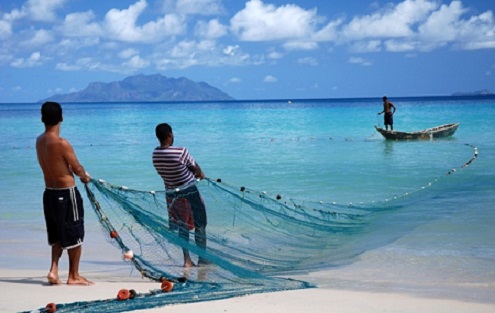Seychelles and 79-Nation ACP Secretariat to Focus on ‘Blue Economy’ at the UN

The Secretariat of African, Caribbean and Pacific (ACP) Group of States and the government of 115-island Seychelles east of mainland East Africa are organizing a joint event at the margins of the UN General Assembly in New York on September 25, 2018 – enabling Small Island Developing States (SIDS) to share experiences in harnessing the blue economy and to identify areas of further development.
The event will be taking place one year after Ministers in charge of Fisheries and Aquaculture in ACP countries concluded two days of comprehensive talks in Nassau, the Bahamas on September 21, 2017. They renewed commitment to developing the fisheries and aquaculture sectors in their countries, as well as unlocking the potential of the ‘blue economy’ through a new ‘ACP Blue Growth Initiative’.
More than 150 delegates from at least 60 fish-exporting countries and regions gathered to strategize on how to enhance the role of fisheries and aquaculture in their national socio-economic development.
“The ACP Group remains determined to play a catalytic role to enhance the sustainable flow of benefits from the fisheries and aquaculture sectors for development of our countries. To this end, it is necessary to enhance capacity building activities, deepen our policy analysis and continuously explore ways to secure funding from our partners for this purpose,” said ACP Secretary General Dr. Patrick Gomes, reaffirming the important role of the sector in ensuring food and nutrition security, livelihoods, and revenues for ACP states.
In the effort to stimulate development of the ‘blue economy’ – which engages a large range of marine-related activities, in environmentally sustainable ways – ministers agreed to allocate 40 million Euro from the Intra-ACP envelope of the European Development Fund (EDF) to the ACP Blue Growth Initiative.
Launched in Nassau, the Blue Growth Initiative is aligned to Goal 14 – dealing with “life below water” – of the United Nations Sustainable Development Goals (SDGs), and seeks to boost productivity and competitiveness of fisheries and aquaculture value chains.
In a final declaration adopted by the Bahamas meeting, ministers also detailed accelerated measures to be taken in order to combat Illegal Unreported and Unregulated (IUU) Fishing, promote effective fisheries management, support small scale fisheries, address the issue of fisheries subsidies at the World Trade Organisation (WTO), and strengthen aquaculture production.
Ministers pledged their commitment to the ACP Strategic Plan of Action for Fisheries and Aquaculture, which aims at aiding countries to coordinate and cooperate on joint actions. They highlighted the need for stronger partnerships, more funding opportunities, as well as South-South and Triangular Cooperation to catalyse progress.
Ministers also emphasised the urgent need to intensify efforts to mobilise financial resources, accelerate technology transfer and build human and institutional capacity in ACP countries to achieve these measures. The declaration called on development partners and the ACP Secretariat to give priority attention to this issue. The 6th ACP Meeting of Ministers in charge of Fisheries of Aquaculture be held in Apia, Samoa in 2019.
The fisheries and aquaculture sector is crucial to reducing poverty and eliminating hunger. This is particularly true for Least Developed Countries (LDCs) and SIDS, the vast majority of which are ACP members. ACP countries’ annual exports of fisheries products amount to as much as $US 5.3 billion, constituting half the total value of traded commodities in some countries. Nevertheless, the sector is facing severe challenges.
ACP Press /InDepthNews
